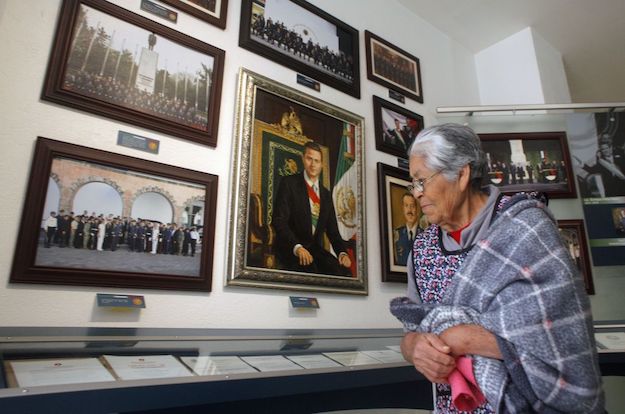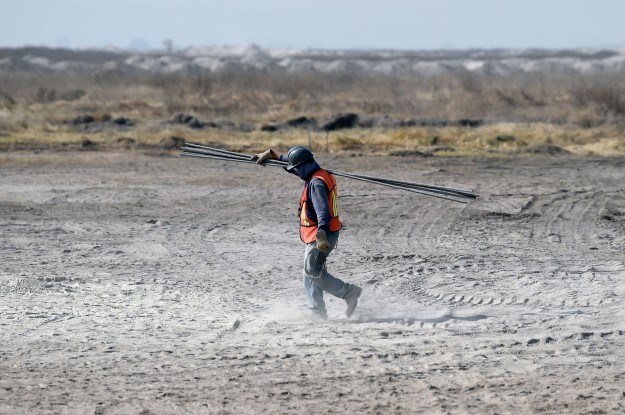MEXICO CITY – Vanessa Rendón and her father were among the first to cross the gates leading to the presidential palace inside Chapultepec Park. Before Saturday morning, few Mexicans had even seen photos from inside Los Pinos, where Mexico’s presidents have lived since the 1930s.
But on Dec. 1, Los Pinos opened to the public with a live outdoor broadcast of Andrés Manuel López Obrador’s swearing-in as Mexico’s president. Keen to signal a break with what he calls the excess of the political class, López Obrador (known as AMLO) has turned the palace into a museum and cultural center and will live and work in more austere surroundings. Overnight, the former presidential residence has gone from a daunting reminder of state authority to a public symbol of the new president’s mass appeal.
“We came to watch the inauguration speech at Los Pinos because it’s historic – this is a place where authoritarian governments have exercised their power,” Rendón, a professor at Mexico City’s UNAM university, told AQ.
Eighty-eight percent of Mexicans believe their government serves only a few powerful interests, according to Latinobarómetro. But AMLO’s use of symbols to signify change – he’s cut his own salary, flew commercial on his first trip as president and plans to sell the presidential plane – has convinced supporters that this time will be different.
Some 30,000 visitors walked the grounds of the palace on inauguration day Saturday, and twice that number was expected on Sunday.
“(The opening) is especially meaningful because other countries don’t have the degree of exclusivity around president’s homes that we had here,” Luis Marín, a designer who visited the park on Sunday afternoon, told AQ.
The buildings that comprise Los Pinos will eventually house art and cultural exhibitions, a spokesman said. But for now, they are what they are: recently vacated, if opulent, office spaces. Empty bookshelves, chewed-up carpet and screws that once held TVs to the wall sit behind signs installed by the new government that read, “This is how we received it.”
The message that there’s a new boss in town is one AMLO tried to convey throughout his five-month transition to office. Following his controversial decision to cancel a $13 billion airport project outside Mexico City in October, the then-president elect appeared in a video explaining his choice with a book titled “Who’s in Charge Here?” sitting visibly at his side.
That message sits uneasily with critics who worry AMLO’s personality politics could weaken Mexican democracy. But for supporters, the arrival of a president with an ear for their concerns is a welcome change. Outgoing President Enrique Peña Nieto was often criticized for “not getting that he doesn’t get it,” and leaves office with approval ratings in the 20s.
Nor is symbolic change necessarily devoid of substance. López Obrador’s majority in Congress has already passed legislation that will allow for the creation of a truth commission to investigate the Ayotzinapa case, the disappearance of 43 students in 2014 that has become synonymous with Peña Nieto’s failure to reduce crime and impunity.
And on inauguration day, López Obrador gave special consideration to Mexico’s indigenous and Afro-descendant communities in a ceremony in the Zócalo, Mexico City’s main public square. Evelyn Sánchez, an AMLO volunteer of indigenous descent who traveled from Tijuana to watch the inauguration, told AQ it was the first time she felt represented by her president.
But many of AMLO’s promises, such as one to undo his predecessor’s education reform, have yet to be backed up with a clear plan for implementation. Critics also suggest that his pledge to pay for social programs in large part by reducing political perks and limiting corruption – which AMLO says costs the country $25 billion per year – is overly optimistic.
Meanwhile, the president’s supporters have concrete expectations to go along with their uplifted spirits.
“I’m moved to tears that I’ll get to see this transformation,” Rendón’s father, Raúl, told AQ. “I also hope that, like he said, AMLO will be able to increase my pension, so we can live just a little better.”
—
Russell is AQ’s correspondent in Mexico City









